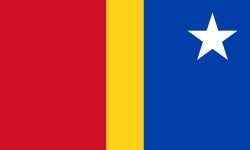The 22nd Sarki was Mohamma Kisoki. He was the son of Abdulahi and Lamis, who built a house at Bani-Buki and established a market there, and was the mother of Dabkare Dan Iya.
Kisoki put him in the “Kano nine,” and for that purpose expelled Berde. Kisoki was an energetic Sarki, warlike and masterful. He ruled over all Hausaland east and west, and south and north.
He waged war on Birnin Unguru because of Agaidam. When he entered the town, Sarkin Kano took his seat beneath the “kuka” tree, at the Kofan Pada, and assembling the inhabitants of the town at the Kofan Bai, reduced them to terrified submission. He gave orders that no men were to be made prisoners, but that only clothes and horses were to be taken.
Then he left Unguru and lived for a month in the bush. The Sarkin Bornu sent to him and said: “What do you mean by making war?”
Kisoki replied: “I do not know, but the cause of war is the ordinance of Allah.” The Sarkin Bornu said nothing more.
The men of Kano returned to Kano. In the next year the Sarkin Bornu came to attack Kano, but could not take the town and returned home.
Then Kisoki said to one of his men, Dunki, “Mount the wall, and sing a song in praise of the Sarki and his men of war.”
Dunki went. The song that he sung was this: “Kisoki, physic of Bornu, and the Chiratawa.” He sung it again and again, and after that he praised all those who were present at the fight; as Galadima Bawa, Mai-Dawakin Maisanda, Mai-Dawakin Gawo Magani, Dan Kudu Dufi Koamna, Makama Abdulahi, Makama Atuman, Dan Yerima Gajeren Damisa, Dan Buram Sagagi, Umoru Dan Maji, Dan Makoiyo Jigu, Dan Goriba Jar Garma, Dan Darmenkorau and Gaji Dan Bauni and many others, about forty in all. Dunki sang their praises for forty days on the top of the wall. After these he celebrated anyone else he thought worthy, as Madaki Koremma, Dagachi, Alkali Musa Gero, Sarkin Kasua, Liman Kano, Sarkin Bai, Dan Maji, Sarkin Yara, the eunuchs and San Turaki. The Madaki Auwa, because she was grandmother of Abdulahi, was also celebrated, in a song beginning:
- Mother! Kano is your country.
- Mother! Kano is your town.
- Old lady with the swaggering gait,
- old lady of royal blood,
- guarded by men-at-arms.
Others there were too—34 in all. In Kisoki’s time Shehu Tunus, who brought Kshifa to Hausa, came to Kano. Dan-Goron-Duma also came, and Shehu Abclu Salam, who brought with him the books Maḍawwanna, Jam ‘as-saghir and Samarkandi. In the next year Tubi came from Zukzuk to learn from Shehu Tunus and became his chief disciple in Kano. Shehu Tunus told Kisoki to build a Friday Mosque for the Rumawa. Kisoki built it.
A certain mallam named Shehu Karaski, and Magumi and Kabi came from Bornu. They were brothers. Kisoki took a liking to Shehu Karaski and asked him to become Alkali. He refused, and suggested his brother Magumi. Magumi agreed, and built a portico at the Kofan Pada.
In Kisoki’s time, Zaite, Tamma, Buduru, and Koda came to Kano. Kisoki ruled the town with his mother Iya Lamis and his grandmother Madaki Auwa, and Guli, the brother of Madaki Auwa. Guli was much respected by the Sarki; he came to have power over the whole country. This is the reason every counsellor is called Na-Guli.
Kisoki ruled Kano 58 years.
 This article incorporates text from this source, which is in the public domain .
This article incorporates text from this source, which is in the public domain .